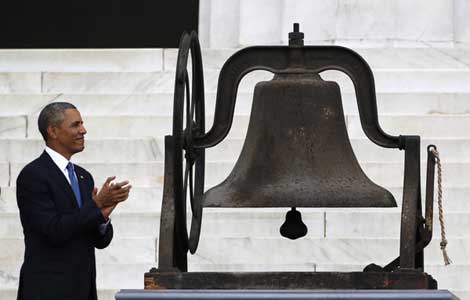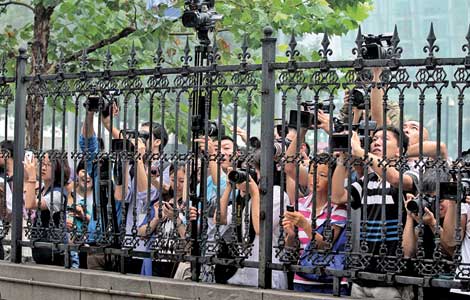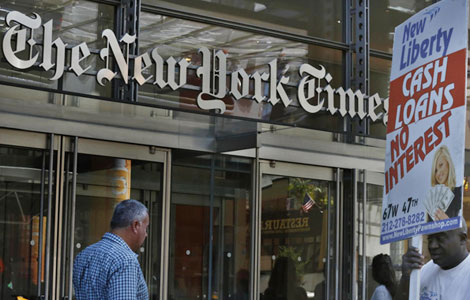Fiscal gap widens as economy slows down
Updated: 2013-08-29 07:12
By Zheng Yangpeng (China Daily)
|
||||||||
Local governments face large shortfall in revenue despite raking in land transfer fees
Despite a surge in local land sale revenue, governments in China still face a widening gap between revenue and spending, Finance Minister Lou Jiwei said on Wednesday.
"Fiscal revenue growth has slowed down, especially for the central government. The gap between fiscal revenue and expenditure remains prominent," Lou reported to the Standing Committee of the National People's Congress, the top legislature.
China's public finance revenue from January to July grew 8 percent year-on-year to 8 trillion yuan ($1.3 trillion), on par with the growth target set earlier in the year.
But the central government's fiscal revenue only grew 2.6 percent, well below the 7 percent official target.
Lou attributed the slow revenue growth to a deceleration in the broader economy, the ongoing value-added tax reform and low growth in imports.
Affected by a sluggish import sector, tariff income fell "substantially", Lou said, without giving an exact number.
Besides the general fiscal picture, Lou also discussed government-managed funds. The funds, mainly made up of land transfer fees, posted record growth of 41.1 percent to 2.53 trillion yuan in the first seven months.
Of the various fees that go into the funds, land transfer fees surged 49.4 percent to 2 trillion, accounting for 79.5 percent of the funds. By comparison, land sale revenues in the same period last year slumped 27.1 percent.
"The upsurge in government-managed funds is because of the land supply increase, robust land turnover and rising land prices," Lou said.
Thanks to booming land and property markets, local governments' fiscal revenue jumped 13.5 percent in the first seven months to 4.2 trillion yuan, defying the broader economic slowdown.
For the remainder of this year, Lou vowed to maintain expenditure in sectors involving living standards, while pursuing reform in the public finance sector.
He signaled that the reform of the consumption tax is in sight, calling for the expansion of items subject to the consumption tax by including resource-intensive, polluting products and high-end consumer goods.
Feng Qiaobin, a professor of public finance at the Chinese Academy of Governance, said expanding the scope of the consumption tax has long been discussed. Policymakers have been considering changing the tax, previously collected solely by central governments and mostly levied on producers, to become a local-government tax levied on the consumer.
Other issues include expanding VAT coverage to the rail, postal and telecommunication sectors. At present, VAT is levied on all modes of transportation except railways and the modern service sectors, which include such activities as consulting.
The resource tax on coal, which has been levied on a volume basis, will be calculated on a price basis, according to Lou.
At the same meeting, Xu Shaoshi, chairman of the National Development and Reform Commission, China's top economic planner, also mentioned the fiscal gap. While revenue grew 8 percent in the first seven months, expenditure rose 8.9 percent.
Other problems identified by Xu include "rising potential risks" in the financial sector, the "large pressure" of the housing price rebound and job stability in certain industries.
Xu also announced that in the first seven months, 8.44 million new jobs were created, up from 7.25 million in the first half of the year.
Zeng Xiangquan, dean of the School of Labor and Human Resources at the Renmin University of China, said although the current job market is "not bad", the situation in particular industries such as restaurants was tough. A mismatch of job seekers' skills and employers' demands persists, Zeng said.
zhengyangpeng@chinadaily.com.cn
(China Daily USA 08/29/2013 page14)

 US vows action in Syria even without UN backing
US vows action in Syria even without UN backing
 Li Na advances to 3rd round
Li Na advances to 3rd round
 Obama, marchers mark 50 yrs since King's speech
Obama, marchers mark 50 yrs since King's speech
 Singers' son pleads not guilty
Singers' son pleads not guilty
 Rubber duck to float in Beijing
Rubber duck to float in Beijing
 New York Times, Twitter hacked by Syrian group
New York Times, Twitter hacked by Syrian group
 Five apps to help you 'breathe' in Beijing
Five apps to help you 'breathe' in Beijing
 Wozniacki survives battle with Chinese qualifier
Wozniacki survives battle with Chinese qualifier
Most Viewed
Editor's Picks

|

|

|

|

|

|
Today's Top News
Suspect charged in Beijing airport blast
87% of AIDS infections in China through sex
White paper issued on China-Africa cooperation
DC crowds reflect on MLK Jr's dream
China, US officials discuss defense ties
Envoy to seek release of US citizen
China leads the way on multilateral defense co-op
Bond trial program set to expand
US Weekly

|

|






